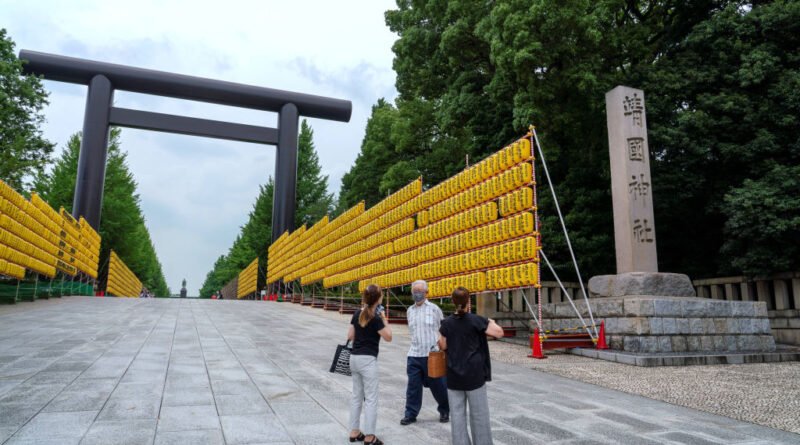An incident in Tokyo involving vandalism by Chinese nationals of a revered site commemorating Japan’s fallen soldiers may be a reflection of the “hate education” long promoted by the Beijing regime.
The Tokyo Metropolitan Police Department’s Public Security Bureau has
apprehended Jiang Zhuojun, a 29-year-old Chinese national residing in Saitama Prefecture, for allegedly helping deface the Yasukuni Shrine war memorial.
Arrest warrants have also been issued for two other suspects, Dong Guangming, 36, and Xu Laiyu, 25, who have since returned to China.
The vandalism sparked outrage among the Japanese public, with many demanding harsh punishment and others warning that a recent increase in anti-Japanese incidents stems from “hate education” promoted by the Chinese Communist Party (CCP).
On the
night of May 31, Mr. Dong was reportedly filmed on camera urinating on a stone pillar at the shrine’s entrance and spray-painting the word “toilet” on it in red. Mr. Xu is accused of recording the vandalism and sharing it on Chinese social media platforms.
The trio is suspected of conspiring in the vandalism, with Mr. Jiang believed to have purchased the spray paint used in the incident. Their actions and relationships are currently under investigation.
The incident has garnered widespread coverage across major Japanese media outlets, including the country’s five leading newspapers. Many have provided continuous follow-up reports, reflecting the seriousness of this issue for the Japanese people.
In a June 4 press conference, Japan’s Foreign Minister Yoko Kamikawa
emphasized that such actions not only violate Japanese law but also the norms of respectful international conduct. She said Japan has expressed its concerns to China, urging Beijing to ensure its citizens respect local laws and maintain decorum while abroad.
Diplomatic Tensions
On June 3, a spokesperson from the Chinese Ministry of Foreign Affairs labeled the shrine “a spiritual tool and symbol of Japanese militarists’ war of aggression against other countries,” and urged Japan to introspect on its historical wartime aggressions. At the same time, the spokesperson called on Chinese nationals to express their grievances in a rational manner.
When
asked by a reporter at a July 10 press briefing whether the two wanted individuals would cooperate with Japan’s investigation, Chinese Foreign Ministry spokesman Lin Jian did not respond. However, he said officials from the Chinese Embassy in Tokyo had met with the suspects and had requested Japan to ensure a fair investigation.
The spokesperson reiterated the call for rational expression among Chinese citizens, although this was absent in the formal statement
released in Chinese by the Chinese Ministry of Foreign Affairs.
Speaking from China in an
interview with Japan’s TBS Television, the primary suspect, Mr. Dong, also known by his online moniker “Iron Head,” asserted that turning himself in was not an option and expressed no regrets or fear. He admitted being involved in the incident, and framed it as a protest against Japan’s release of treated nuclear water.
Mr. Dong further
stated that should Japan threaten significant Chinese interests, he would not hesitate to protest on Japanese soil once more. He said Mr. Jiang, who Japanese authorities had arrested, was a Japanese guide he had met online, and that Mr. Jiang had not disclosed any plans for vandalism to him.
The question of how Japan will deal with the detained suspect and the two who returned to China remains a critical point of public interest, as does the potential response from the CCP.
Previous attacks on Yasukuni Shrine
include a 2001 incident where Chinese national Feng Jinhua vandalized a shrine statue, resulting in a 10-month prison sentence. More dramatically, in December 2011, Liu Rong, also a Chinese national,
committed arson at the shrine and attacked the Japanese Embassy in Seoul with a Molotov cocktail the following month, leading to his arrest and imprisonment in South Korea until November 2012.
The most recent vandalism at the Yasukuni Shrine has not only sparked public outrage but also catalyzed a major discourse in Japan. News posts about the incident have seen extensive comments and shares across social media platforms.
Discussions also delved into the perception that Japanese law might be too lenient on foreigners, with many expressing fears that the suspects could get off with minimal penalties.






